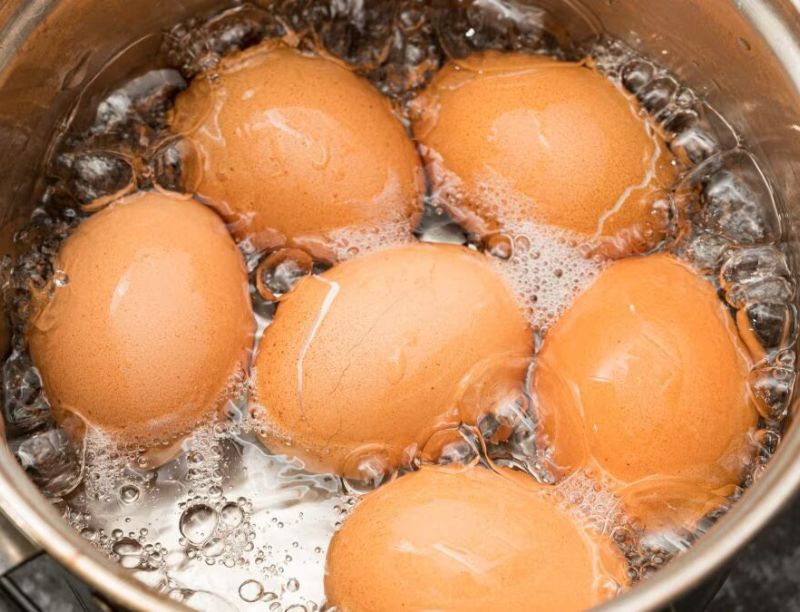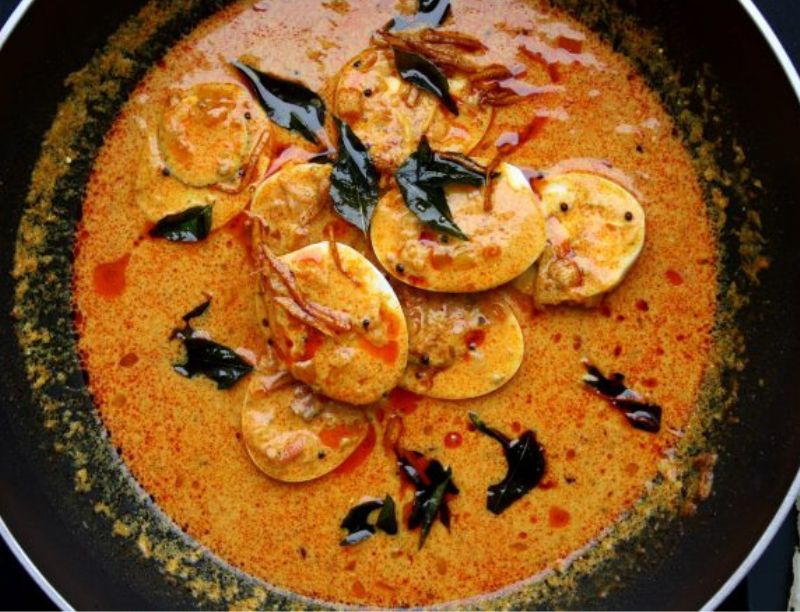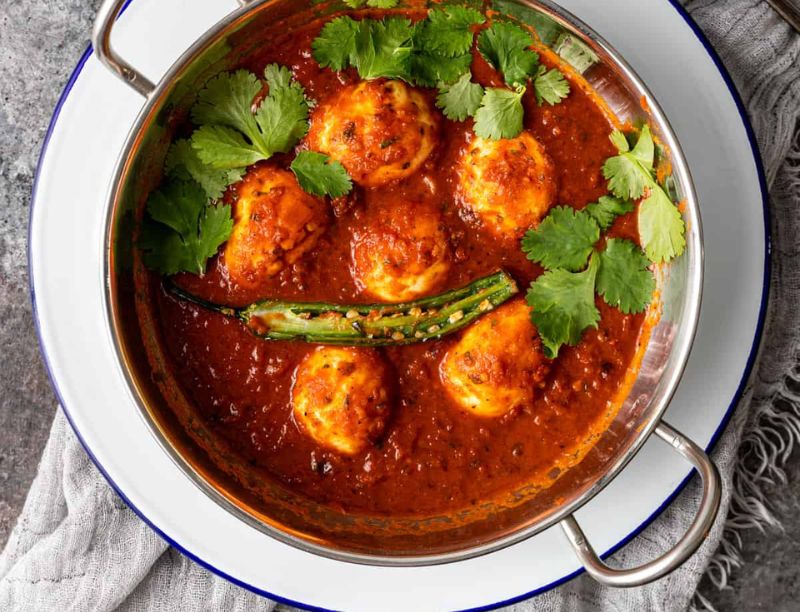Introduction
Egg curry is a beloved dish in Indian cuisine, known for its rich flavors, versatility, and ease of preparation. This delightful dish can be enjoyed with various accompaniments such as rice, roti, naan, or bread. This article will explore the intricacies of making an egg curry, including the ingredients, step-by-step preparation, and some tips and variations to suit different tastes. Regardless of your culinary expertise, this guide will help you create a flavorful egg curry that will impress your family and friends.
Ingredients for Egg Curry
To prepare a traditional egg curry, you will need the following ingredients:
- Eggs: 6 large eggs
- Onions: 2 medium-sized, finely chopped
- Tomatoes: 2 large, finely chopped
- Green Chilies: 2, slit lengthwise
- Garlic: 4-5 cloves, minced
- Ginger: 1-inch piece, minced
- Turmeric Powder: 1/2 teaspoon
- Red Chili Powder: 1 teaspoon
- Coriander Powder: 1 tablespoon
- Cumin Seeds: 1 teaspoon
- Garam Masala: 1/2 teaspoon
- Coconut Milk: 1/2 cup (optional for a creamy texture)
- Oil: 2-3 tablespoons (vegetable or mustard oil)
- Fresh Coriander Leaves: A handful, chopped for garnish
- Salt: To taste
- Water: As required
Step-by-Step Preparation of Egg Curry
Step 1: Boil the Eggs
- Begin by boiling the eggs. Place the eggs in a saucepan of water and bring it to a boil. Once the water starts boiling, let the eggs cook for about 8-10 minutes.

- After boiling, drain the hot water and transfer the eggs to a bowl of cold water. This will make peeling the eggs easier.
- Once the eggs are cooled, peel off the shells and set them aside.
Step 2: Prepare the Base Masala
- Heat the oil in a pan. Add the cumin seeds to the heated oil and let them splutter.
- Add finely chopped onions and sauté them until they turn golden brown. This step is crucial as it forms the base of the curry.
- Cook the onions with the minced ginger and garlic for 2-3 minutes until the raw aroma disappears.
- Now, add chopped green chilies and sauté for another minute.
Step 3: Cook the Tomatoes
- Add finely chopped tomatoes to the onion mixture, and then simmer until they are mushy and tender. Stir occasionally to prevent sticking.
- Once the tomatoes are fully cooked, add turmeric powder, red chili powder, Add powdered coriander. Stir thoroughly and simmer the spices for two to three minutes to release their flavors.
Step 4: Simmer the Curry
- At this stage, add a little water to the pan to create a gravy consistency. The amount of water can be adjusted depending on how thick or thin you prefer the curry.
- To enable the flavors to combine, reduce the heat to a simmer and boil the mixture for five to seven minutes.
Step 5: Add the Eggs
- Add the boiled eggs to the curry very gently. You can leave them whole or cut them in half, depending on your preference.
- Stir the eggs into the gravy, ensuring they are well-coated with the masala.
- If coconut milk is used for a creamier texture, add it now and mix well.
Step 6: Final Touches
- Sprinkle the garam masala over the curry and stir to combine. Garam masala adds a fragrant and warming flavor to the dish.
- Give the curry five more minutes to simmer so the eggs absorb the gravy flavors.
- Finally, garnish with freshly chopped coriander leaves before serving.
Also Read: Kurmure: A Popular Crunchy Snack
Tips for a Perfect Egg Curry
- Use Fresh Ingredients: Fresh onions, tomatoes, garlic, and ginger enhance the flavor of the curry. Avoid using pre-packaged or canned ingredients.
- Adjust Spice Levels: If you like your curry milder, reduce the red chili powder or leave out the green chilies. Conversely, for a spicier version, increase the amount of these ingredients.
- Experiment with Spices: While the basic recipe calls for turmeric, red chili powder, coriander powder, and garam masala, try different spices like fennel seeds, cinnamon, or cloves to add a unique twist.
- Simmer: Allowing the curry to simmer on low heat helps the flavors develop and blend. This step is essential to make a thick gravy.
- Garnish Wisely: Fresh coriander leaves add freshness and color to the dish. For a tangy kick, squeeze in some lime juice.
Variations of Egg Curry
Curry made with eggs is a flexible meal. It can be modified to accommodate various preferences and regional preferences. Here are some popular variations:
- North Indian Egg Curry: This version uses a base of onions, tomatoes, and yogurt flavored with spices like cumin, coriander, and garam masala. The curry is thick and rich, often enjoyed with naan or roti.
- South Indian Egg Curry: In this variation, coconut milk and curry leaves are vital ingredients, giving the curry a distinct South Indian flavor. The gravy is often thinner and spicier, perfect for pairing with steamed rice.
- Egg Masala: A dry version of egg curry, egg masala has a thick, spicy coating that clings to the eggs. It’s usually served with paratha or as a dish with dal and rice.
- Mughlai Egg Curry: This luxurious version includes almonds, cream, and saffron, resulting in a rich and aromatic dish. It’s an excellent option for special occasions or to impress guests.
- Andhra Egg Curry: Known for its fiery heat, Andhra egg curry is made with a blend of red chilies, black pepper, and tamarind. This tangy and spicy curry is a treat for those who enjoy bold flavors.

Serving Suggestions
You can enjoy egg curry with various accompaniments, depending on your preference and regional influences. Here are some serving suggestions:
- Steamed Rice: The simplicity of steamed rice allows the curry flavors to shine. It’s a classic pairing that’s hard to beat.
- Jeera Rice: Pair the egg curry with jeera rice for a slightly more flavorful option. The rice’s subtle aroma of cumin complements the spices in the curry.
- Paratha: If you prefer flaky, buttery bread, paratha is an excellent choice. It adds an indulgent touch to the meal.
- Bread: For a quick and easy option, serve egg curry with slices of crusty bread. It’s a convenient and delicious way to enjoy the dish, especially for breakfast or brunch.
Nutritional Benefits of Egg Curry
In addition to being delicious, egg curry is also nutritious. Here are some of the health benefits associated with this dish:
- High in Protein: Eggs are a great source of premium protein required for the development and maintenance of muscles. You can get enough protein each day by including eggs in your diet.
- Rich in Vitamins and Minerals: Eggs contain essential Minerals and vitamins, including vitamin D, B12, selenium, and choline. These nutrients support various bodily functions, including brain health, immune function, and metabolism.
- Antioxidant Properties: The spices used in egg curry, such as turmeric and garlic, have antioxidant properties that support the body’s fight against oxidative stress and inflammation.
- Heart Health: Contrary to previous beliefs, A heart-healthy diet can include moderate egg consumption. The healthy fats in eggs, along with the use of moderate oil in the curry, contribute to a balanced diet.
Conclusion
Egg curry is a versatile and flavorful dish that has earned its place in kitchens worldwide. Whether you’re looking for a quick weeknight dinner or a special meal for guests, egg curry offers a satisfying option that’s easy to prepare. With its rich gravy, aromatic spices, and the goodness of eggs, this dish will become a favorite in your culinary repertoire.
Following the steps outlined in this article and experimenting with the variations, you can create your signature egg curry that reflects your personal taste and regional influences.
Read More: Laphing Recipe: A Culinary Journey Through Tibetan Delicacy

